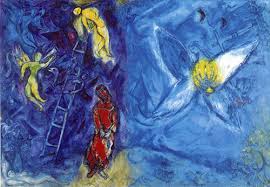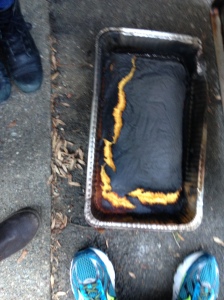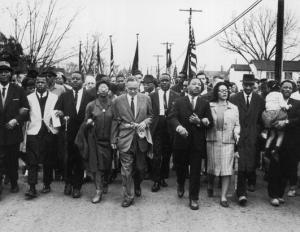A sermon delivered at Second Church in Newton UCC, January 18, 2015
“The boy Samuel ministered before the Lord under Eli. In those days the word of theLord was rare; there were not many visions. One night Eli, whose eyes were becoming so weak that he could barely see, was lying down in his usual place. 3 The lamp of God had not yet gone out, and Samuel was lying down in the house of the Lord, where the ark of God was. 4 Then the Lord called Samuel. Samuel answered, “Here I am.” 5 And he  ran to Eli and said, “Here I am; you called me.” But Eli said, “I did not call; go back and lie down.” So he went and lay down. Again the Lord called, “Samuel!” And Samuel got up and went to Eli and said, “Here I am; you called me.” “My son,” Eli said, “I did not call; go back and lie down.” Now Samuel did not yet know the Lord: The word of the Lord had not yet been revealed to him. A third time the Lord called, “Samuel!” And Samuel got up and went to Eli and said, “Here I am; you called me.”Then Eli realized that the Lord was calling the boy. 9 So Eli told Samuel, “Go and lie down, and if he calls you, say, ‘Speak, Lord, for your servant is listening.’” So Samuel went and lay down in his place. The Lord came and stood there, calling as at the other times, “Samuel! Samuel!” Then Samuel said, “Speak, for your servant is listening.”–1 Samuel 3: 1-10
ran to Eli and said, “Here I am; you called me.” But Eli said, “I did not call; go back and lie down.” So he went and lay down. Again the Lord called, “Samuel!” And Samuel got up and went to Eli and said, “Here I am; you called me.” “My son,” Eli said, “I did not call; go back and lie down.” Now Samuel did not yet know the Lord: The word of the Lord had not yet been revealed to him. A third time the Lord called, “Samuel!” And Samuel got up and went to Eli and said, “Here I am; you called me.”Then Eli realized that the Lord was calling the boy. 9 So Eli told Samuel, “Go and lie down, and if he calls you, say, ‘Speak, Lord, for your servant is listening.’” So Samuel went and lay down in his place. The Lord came and stood there, calling as at the other times, “Samuel! Samuel!” Then Samuel said, “Speak, for your servant is listening.”–1 Samuel 3: 1-10
“The next day Jesus decided to leave for Galilee. Finding Philip, he said to him, “Follow me.” Philip, like Andrew and Peter, was from the town of Bethsaida. 45 Philip found Nathanael and told him, “We have found the one Moses wrote about in the Law, and about whom the prophets also wrote—Jesus of Nazareth, the son of Joseph.” “Nazareth! Can anything good come from there?” Nathanael asked. “Come and see,” said Philip. When Jesus saw Nathanael approaching, he said of him, “Here truly is an Israelite in whom there is no deceit.” “How do you know me?” Nathanael asked. Jesus answered, “I saw you while you were still under the fig tree before Philip called you.” Then Nathanael declared, “Rabbi, you are the Son of God; you are the  king of Israel.” Jesus said, “You believe because I told you I saw you under the fig tree. You will see greater things than that.” 51 He then added, “Very truly I tell you, you will see ‘heaven open, and the angels of God ascending and descending on ’the Son of Man.” –John 1: 43-51
king of Israel.” Jesus said, “You believe because I told you I saw you under the fig tree. You will see greater things than that.” 51 He then added, “Very truly I tell you, you will see ‘heaven open, and the angels of God ascending and descending on ’the Son of Man.” –John 1: 43-51
Yesterday was a very normal day at Second Church. As we do twice a month, folks gathered in our kitchen to cook a dinner for a men’s shelter in Dorchester. Our Youth Groups will sign up at least twice a year to help do the cooking, and yesterday was one of those days. We were going about our business, cooking meat and pasta, mixing corn bread and brownies, chopping vegetables and mixing salads. About an hour in, one of our teens said, “Is something on fire?” Me and the other adults looked around and said, “No, everything seems normal.” A little while later another tiny voice piped in, “Umm…there’s a lot of smoke in the air. Is something burning?” We looked around…”No….no, everything seems fine.” Seconds later the smoke alarm went off and someone yelled, “THERE’S A FIRE IN THE OVEN!” Apparently a pan of cord bread had caught fire in the oven. Within minutes four fire trucks were sitting in front of the church and the fire fighters came through the building asking what was going on…and we pointed them to the charred pan of corn bread that we had already extinguished and put outside. A very normal day…on paper. But in practice, it was an important lesson in listening closely to voices that are often overlooked. And it was known from that day on as the great Second Church Corn Bread Conflagration! 
It should be a story that gets retold, not just because it was exciting and everything turned out OK in the end, but because it is an incident that can serve as a perfect illustration for how and why people like us—people of status and privilege—sometimes have difficulty hearing God’s call for us. Not only were there smoke alarms and fire trucks, but we also had 8 teenagers who had been helping us prepare the meal—none of whom, I must say, had anything to do with the fire—which meant there were 8 kids on 8 phones calling their parents and responding to questions, “Mom, we’re ready to get picked up. No, the cooking isn’t quite done, but the fire is out. See you when you get here.” So there were alarms, sirens, questions, chatter, relays of information in and out of the kitchen, “What was it that burned? What about the corn bread? Where is the corn bread? Oh, the corn bread burned? What about the brownies? Everyone, the brownies are NOT on fire!”
Call and response. On this Martin Luther King Jr. Weekend we hear stories about God’s call, and we tell stories about people who have answered their call, and we must wonder for ourselves, “What is my call? When will God call my name? When will Jesus himself walk by and ask me to follow? When will my mission in the world become clearly defined? And once it is…once there is no denying what I was put on this earth to do…what will be my response?” But yesterday, as the kitchen filled with smoke and my vision became blurry, I saw with perfect clarity why our sense of God’s call, and our ability to respond to that call is such a muddled and confusing thing. It’s because we are people who deal in alarms and sirens, direct questions with direct expectations. The easiest phone calls to make are the ones in which you have a specific phone number so you can call one specific person about one specific thing, and if you don’t reach them, you can leave a message on their voice mail. We are a people who respond best to clarity…and God’s call is generally anything but clear.
Just looking at the Call Narratives that are in our Scripture lessons this morning: Even when Samuel hears his own name being called, he doesn’t know who is calling him. He goes to his teacher Eli numerous times before understanding that it’s not him who is calling. And as we read a story about Jesus calling his disciples to follow him, we have the advantage of hindsight, we know who Jesus is and why he is important, but on the day that he called Nathaniel and Phillip to follow him, he’s just some guy from Nazareth. Nazareth, as far as we can tell, was a small, poor, unimportant town filled with nothing but small, poor, and unimportant people. “Can anything good come from Nazareth,” Nathaniel asks outright. To which Phillip replies, “Come and see.” When Samuel finally understands that it’s not his earthly teacher calling him but his Heavenly Father, he finally replies, “Speak, for your servant is listening.”
Martin Luther King Jr. was born to a black preacher in the segregated south in the 1920’s. It is noted in many biographies of Rev. Dr. King—including on his Wikipedia page—that at an early age he denounced many teachings of the church, casting doubt on stories of Jesus’ divinity, questioning his own father’s teachings on Christ, and sin, and God. He became known as a singer and a leader among his classmates  before he ever considered a career in ministry. But by the time he was 18, he had concluded for himself that the Bible possessed the best possible teachings, and represented the greatest possible hope, for dismantling segregation and systemic hatred and violence in the south. By the time he was 25 he was known as a minister. By 26 he was known as Doctor. By 27 he was known as a boycotter. By 28 he was known as an organizer and non-violent protestor. By the time he was 30 he was known as a marcher. By the age of 33 he had been mown as a prisoner multiple times over, for refusing to submit to the authority of the government of Alabama. And by the age of 35 he was known as the youngest recipient of the Nobel Peace Prize…having been an instrumental force in helping his people win the right to exercise their rights in the voting booth. Once he was asked, “How can you hope to be effective in all these different projects? Boycotts, marches, speeches, sit ins, it’s a lot of madness, doesn’t it detract from your message?” To which Rev. Dr. King responded, “It’s all part of one effort, to save our lives.” That is a story about Martin Luther King’s response to God’s call. A life lived and sacrificed in many different ways for the specific purpose of saving the lives of black men and women.
before he ever considered a career in ministry. But by the time he was 18, he had concluded for himself that the Bible possessed the best possible teachings, and represented the greatest possible hope, for dismantling segregation and systemic hatred and violence in the south. By the time he was 25 he was known as a minister. By 26 he was known as Doctor. By 27 he was known as a boycotter. By 28 he was known as an organizer and non-violent protestor. By the time he was 30 he was known as a marcher. By the age of 33 he had been mown as a prisoner multiple times over, for refusing to submit to the authority of the government of Alabama. And by the age of 35 he was known as the youngest recipient of the Nobel Peace Prize…having been an instrumental force in helping his people win the right to exercise their rights in the voting booth. Once he was asked, “How can you hope to be effective in all these different projects? Boycotts, marches, speeches, sit ins, it’s a lot of madness, doesn’t it detract from your message?” To which Rev. Dr. King responded, “It’s all part of one effort, to save our lives.” That is a story about Martin Luther King’s response to God’s call. A life lived and sacrificed in many different ways for the specific purpose of saving the lives of black men and women.
I wish I could tell everyone here exactly how to discern God’s call, and exactly how to respond to that call. But I can’t. That is only something each of us as individuals and ALL of us as a dedicated community can discern. The stories we tell today do offer some guidance: God’s call is persistent. We don’t have to worry about God calling us just one time and giving up if there’s a busy signal or nobody home. God will continue to call time and time again. And when we finally hear the call, it’s very natural for us to turn to known authorities for guidance or permission…but as the call narratives today affirm…when we are called by God, God is the only authority that matters. And the trickiest part of all: God’s call often comes from and is focused on the people, places, and events that the rest of the world devalues or ignores. Just like Nathaniel said about Jesus, “What good ever came out of Nazareth?” Any time we find ourselves scratching our heads at something and saying, “Well, what good is going to come out of this?” don’t dismiss it out of hand…because you might be just about to encounter God directly.
Martin Luther King Jr. wrote in his letter from jail in Birmingham, “I have almost reached the regrettable conclusion that the Negro’s great stumbling block in his stride toward freedom is not the White Citizen’s Councilor or the Ku Klux Klanner, but the white moderate, who is more devoted to order than to justice; who prefers a negative peace which is the absence of tension to a positive peace which is the presence of justice.”
This is the challenge to be God’s people in our time and our place: In an ever-expanding universe of violence, pollution, degradation, corruption, and injustice…a universe that grows more complicated and convoluted by the minute….what is the one thing God is calling YOU to do…and how will you respond to that call? In a world of alarms and sirens…God’s call is heard as a whisper. Listen carefully. In a culture of immediacy and efficiency, God’s call complicates and confounds our expectations. Walk slowly, and walk together. In lives of luxury and privilege, God’s call gets us longing for a life that is more full and vibrant and diverse and VITAL than any life we could buy for ourselves. Live openly. When you find yourself pulled to listen to people who don’t matter, when you find yourself curious about things that seem unimportant, when you find yourself occupied by voices that bother you, or causes that confuse you, or doubts that just will not go away…treat those like a fire alarm and say, “Speak, for your servant is listening.” I promise you, our God is still speaking and there is something in this world that waits for you and you alone, and it is bigger and brighter than anything else we’ve known. What might that be? Come…come and see.